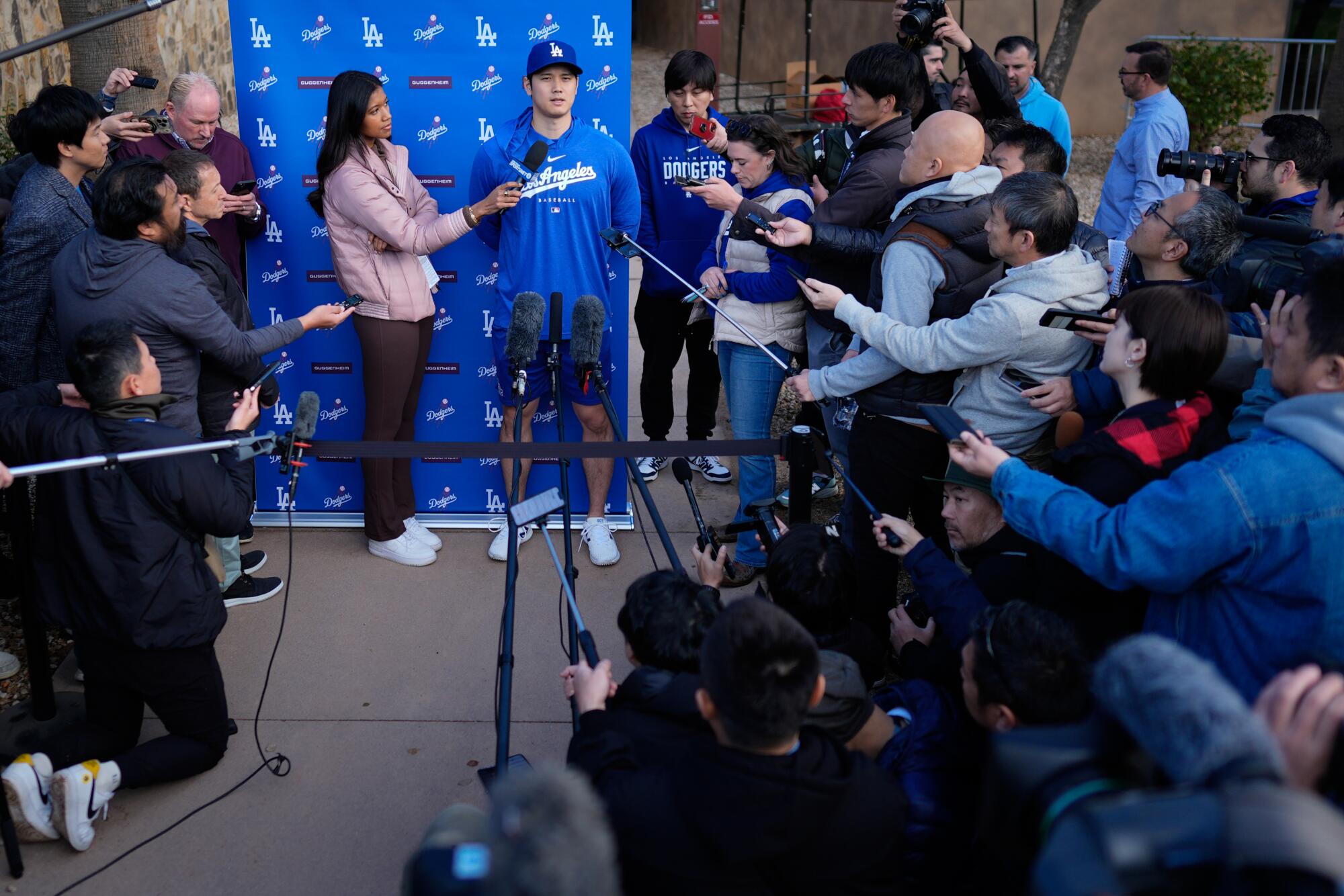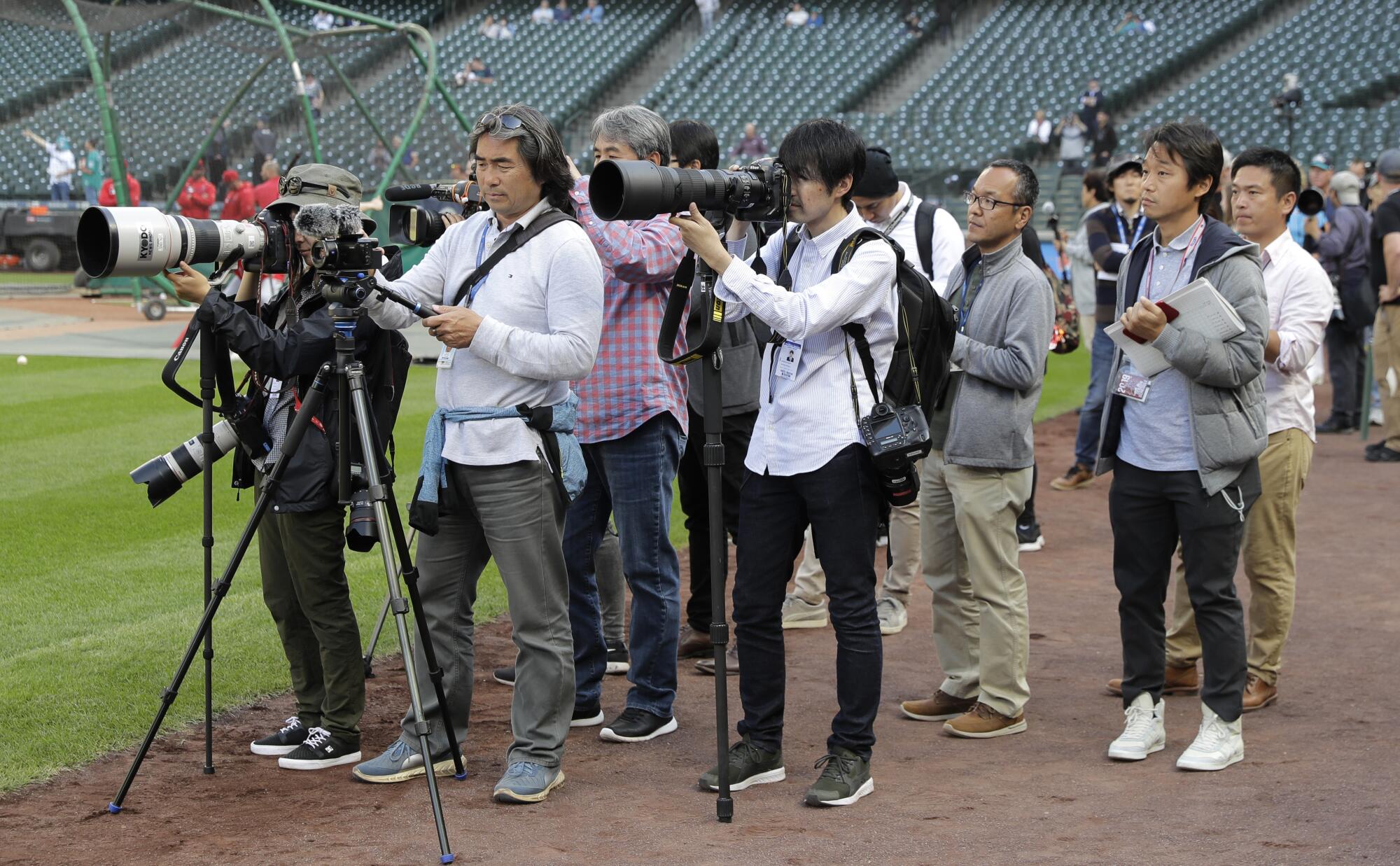-
L.A. neighborhood hit by burglars for at least the third time in July - 27 mins ago
-
Harrison Butker’s Comments on Olympics Opening Ceremony Goes Viral - 36 mins ago
-
Justice Dept. Settles Lawsuit With Former F.B.I. Officials Targeted by Trump - 45 mins ago
-
O.J. Simpson property auction approved to pay off civil claims - about 1 hour ago
-
Kamala Harris Lands Fifth Polling Win in 24 Hours - about 1 hour ago
-
How the U.S. Captured One of Mexico’s Biggest Drug Lords - about 1 hour ago
-
Mets’ Kodai Senga Exits First Start of Season With Injury - 2 hours ago
-
Fresno County man sentenced for sexually assaulting children, dog - 2 hours ago
-
Doused by Rain, Paris Opens Its Games With a Boat Party on the Seine - 2 hours ago
-
How to Watch Men’s Tennis at the 2024 Paris Olympics: Streams, Schedule - 2 hours ago
How Japanese media cover the Shohei Ohtani gambling scandal
Japanese citizens recognize that baseball players betting on baseball — even if the wagers aren’t made on a bettor’s team — is taboo. Most support bans on nearly any sort of sports gambling. A cultural aversion to gambling exists, even though placing bets illegally has a long and lively history on the island nation.
So the sports gambling scandal involving national hero Shohei Ohtani and his former interpreter, Ippei Mizuhara, has shaken the Japanese people. According to reporters whose assignment for years has been to cover all aspects of Ohtani, their readership demands daily detailed updates of the two-way star’s on-field activities, while also anxiously awaiting (and often dreading) the next development in the perplexing gambling saga that so far has produced more questions than answers.
Ohtani has denied Mizuhara’s initial contention that Ohtani paid at least $4.5 million of his gambling debts to an Orange County-based illegal bookmaking operation. In a statement he read to an assembly of about 70 reporters at Dodger Stadium last week, Ohtani said, “I never bet on baseball or any other sports, or have never asked somebody to do on my behalf and I have never went through a bookmaker to bet on sports.”
He also denied paying Mizuhara’s debts, accusing his interpreter and friend since 2013 of stealing the money and lying to him. “I’m very saddened and shocked that someone who I’ve trusted has done this,” Ohtani said five days after the Dodgers fired Mizuhara.
As federal authorities and MLB conduct investigations, Ohtani continues to play for the Dodgers, generating rousing applause with each at-bat. In Japan, he is treated with even more deference — and esteem.
“Shohei was the top news every single day, even before the gambling story,” said Natsuko Aoike, who is based in Los Angeles to cover Ohtani for Tokyo Sports, a Japanese daily newspaper. “I almost feel like in L.A., you are only seeing a glimpse of how Japan is covering Shohei Ohtani. It’s actually much more if you go to Japan. It’s a major, major story. I’d say it is equivalent to a presidential election.”
Japanese media are reluctant to criticize Ohtani and even more reluctant to speculate on a worst-case scenario regarding the Dodgers designated hitter and pitcher who signed a $700-million contract in the offseason, by far the largest in MLB history.
“A player who was viewed as flawless has suddenly become wrapped up in a scandal,” said Taro Abe, in his fourth year covering Ohtani for daily newspaper Chunichi Shimbun. “Unlike in the U.S., there are almost no reports that cast doubt on Ohtani.
“Ohtani is viewed as a victim who was tricked by Mizuhara and there are few voices that question Ohtani’s responsibility.”

The Dodgers’ Shohei Ohtani, with interpreter Ippei Mizuhara, right, speaks to the media on Feb. 9, the first day of spring training workouts at Camelback Ranch in Phoenix.
(Carolyn Kaster / Associated Press)
Gambling law experts in the U.S. have questioned how Mizuhara gained access to Ohtani’s bank account without his knowledge. In Japan, experts have pointed out that an associate as close to Ohtani as Mizuhara could have gained his trust with finances.
“There have been reports [in Japan] about how much professional athletes, not just MLB players, manage their own assets,” said Naoyuki Yanagihara, a reporter who covers Ohtani for Sports Nippon, an influential sports daily newspaper since 1948.
Japanese baseball fans can recall at least two gambling episodes that resulted in players being banned from the game for life. Few — if anyone — want to believe Ohtani is on a similar path.
Pitcher Kyosuke Takagi of the Yomiuri Giants — a venerable franchise comparable in Japan to the Dodgers or New York Yankees — admitted in 2016 to betting on baseball games and lying during the team’s investigation.
‘’I’ve betrayed all the people who supported me since I started playing baseball in elementary school,’’ Takagi said a day after he told the club he bet on baseball in 2014. ‘’I’m very sorry for my actions.’’
Three other Giants players bet on baseball months earlier, and received indefinite suspensions. Although none of the four were found to have bet on games in which they were involved, Takagi’s confession led to the resignation of three Giants executives.
That episode occurred decades after the infamous “Black Mist Scandal,” when from 1969 to 1971 several Japanese players were punished for accepting money from organized crime figures known as yakuza to throw games. The punishments ranged from six players banned from baseball for life to stern warnings for others.
Today, gambling remains illegal in Japan, with the following publicly-operated exceptions: horse racing, cycling races, boat races, auto races and the lottery. Casinos are nonexistent.
In the U.S., 38 states have made sports gambling legal. Online gambling is prevalent, with sports gambling generating a record $10.92 billion in revenue for 2023, according to the American Gaming Assn.’s annual report.
“Unlike in the United States, the environment [in Japan] isn’t one in which gambling is out in the open,” Abe said. “Compared to the U.S., the sports on which you can bet are extremely limited and illegal betting by athletes become huge scandals. There is a negative perception of gambling, and it’s very different from the United States, where you can easily place a bet.”
Even the pinball-like arcade game Pachinko —which proliferated since the 1920s thanks to a loophole in Japanese gambling laws — is in decline, with the number of Pachinko parlors dropping from nearly 19,000 in the 1990s to barely more than 8,000 today.
Still, gambling is recognized by the Japanese government as a potential source of untapped revenue, just as it has become in the U.S. A Japanese law was passed in 2018 permitting poker and other games in an effort to boost revenue and tourism. Also, a controversial plan to build Japan’s first gambling resort in Osaka by 2029 has been officially approved.

Members of the Japanese media watch Shohei Ohtani throw in the outfield before an Angels game at on May 30, 2019.
(Ted S. Warren / Associated Press)
Yet in Japan, Ohtani is a symbol not just of baseball prowess, but as “kanpeki na hito” — a perfect person — because of his perceived humility, dedication to his craft and polite demeanor.
“There is almost no criticism of Ohtani,” Abe said of Japanese media. “Especially after Ohtani spoke publicly and offered an explanation, I think there are fewer people who believe he paid Mizuhara’s debts. Most people believe what he says. Regarding the question of how Mizuhara accessed the bank account, many experts are offering opinions, but they aren’t doubting Ohtani.”
When Japanese reporters want to include in a story a question about Ohtani’s role in the scandal, they often cite the reporting of a U.S. reporter or columnist.
“Dylan Hernández [who speaks fluent Japanese] of the Los Angeles Times is famous in Japan,” Abe said. “Besides him, the ESPN reporter [Tisha Thompson] who wrote about the illegal gambling problem has had her stories picked up in Japan and been interviewed. It’s extremely common in Japanese sports reporting to run articles based on the translations of American stories, and that’s not just limited to this scandal.”
Mizuhara, by contrast, has become a convenient villain. A day after saying Ohtani knew about Mizuhara’s gambling addiction and knowingly paid his debts, Mizuhara told ESPN that Ohtani had no knowledge of his gambling debts and that Ohtani had not transferred money to pay them.
Aoike, for one, prefers to remember Mizuhara as an excellent translator who never raised suspicions that he might have a gambling addiction.
“I was always impressed how, when he translated, Ippei was so good at picking up Shohei’s nuances,” said Aoike, who was raised in Japan and speaks the language. “I would sometimes understand a little bit more about what Shohei meant by listening to Ippei. They were so in sync.”
Japanese reporters covering Ohtani — and other Japanese players in MLB — rarely ask questions about players’ private lives. They were as surprised by the Ohtani-Mizuhara scandal as anyone else.
“Because we have to work with him every day, and we don’t want to be banned for doing the wrong thing, we want to work within Shohei’s wishes,” said Aoike, who began covering Ohtani when he signed with the Angels in late 2017. “Ippei was easier to talk to, and we wouldn’t be bugging Shohei, so it came out of a politeness that Ippei would answer as much as possible.”
One question Mizuhara was asked and answered daily was simply when Ohtani planned to leave the stadium after a game or practice. Japanese reporters are expected to arrive before the player they cover does and stay until after the player leaves.
“That was very, very beneficial,” Aoike said.
Source link

















